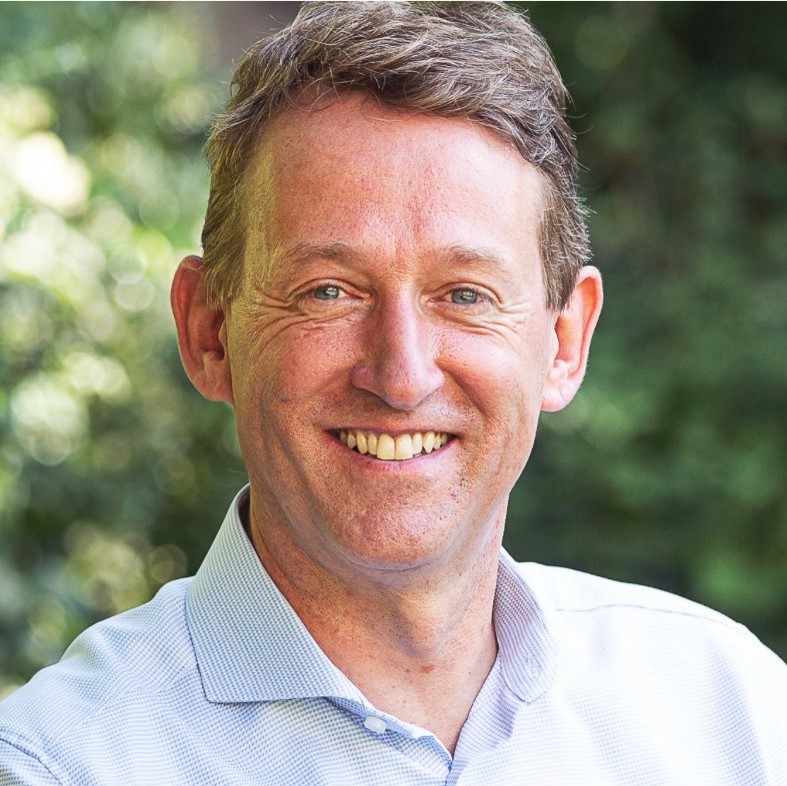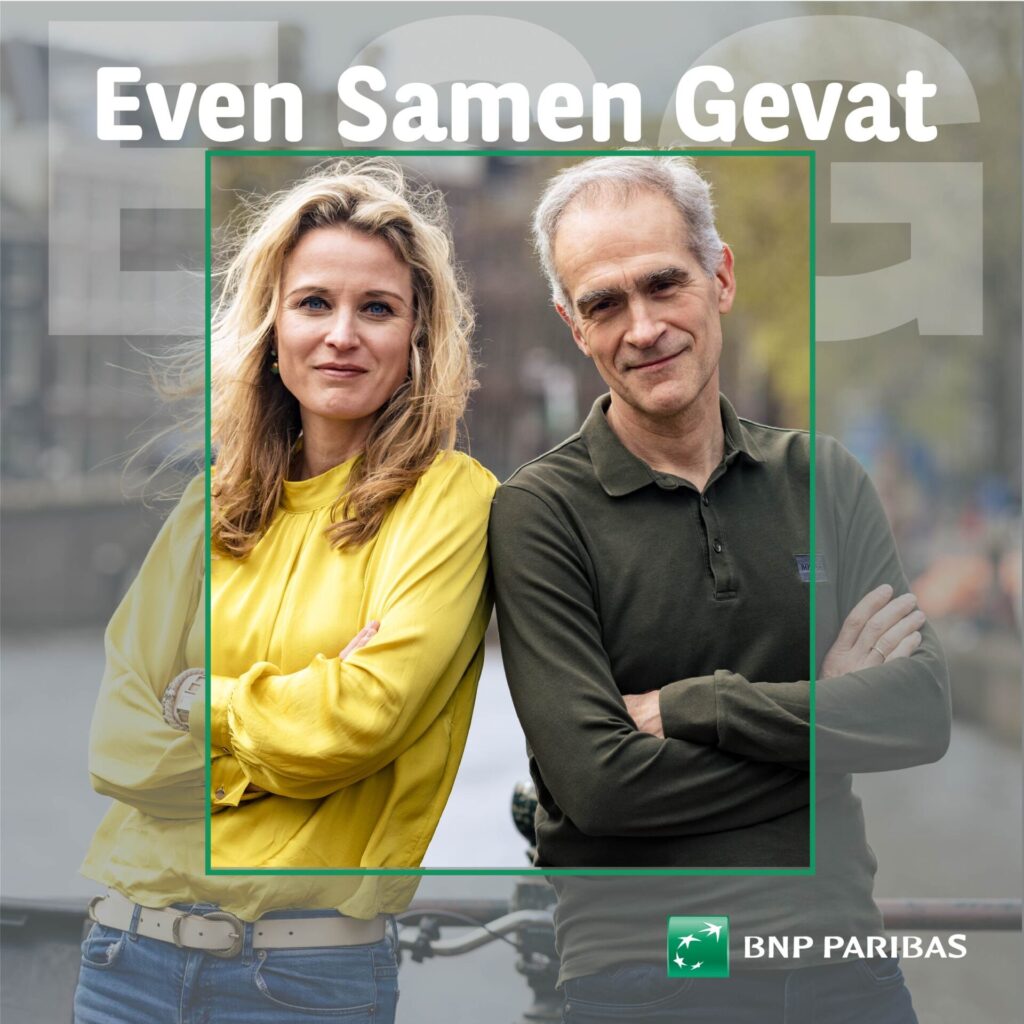A fair energy transition
In episode 32 of ESG (Even Samen Gevat), Marloes and Aldert speak with Wilfried Remans, head of the Sustainability Network at BNP Paribas in Brussels.
‘I’m building a nest’, says Wilfried. It’s a nice play on words. NEST stands for the Network of Experts in Sustainability Transitions, but at the same time it really is a kind of nest. NEST is a virtual network of about 500 employees at BNP Paribas who are involved in sustainability in one way or another. By being better informed about each other’s activities, they can accelerate the pace at which the bank stays on top of sustainability. One of the areas in which people are linked together is a fair energy transition.
The choices that have to be made in this respect are not always easy. That’s why the bank has sector policies. For instance, BNP Paribas no longer invests in companies specialised in shale gas and shale oil or in electricity companies that work with coal and don’t have any transition plans. For other companies, the bank prefers to ‘maintain a presence to guide our clients in their transition and to set conditions.’ That guidance can roughly be divided into two types: (1) financiering the transition of individuals, companies and governments and (2) offering investors opportunities for impactful investments for society, clients and the relevant business. ‘The ultimate goal is, of course, to be able to better guide our clients in their transition’, says Wilfried.

‘The ultimate goal is, of course, to be able to better guide our clients in their transition’
But BNP Paribas itself is also active in sustainability and is part of the Net-Zero Banking Alliance: ‘All major banks in the world, as well as insurers and asset managers, have committed themselves to being climate neutral by 2050.’ Cooperation is crucial. ‘So we and several other banks – one of which is Dutch – have set up a methodology to calculate in our loan portfolio, for example, how much CO2 we will be financing if we lend money to electricity companies, for instance.’
From self-correcting to compulsory
But other measures are needed as well to steer the energy transition in the right direction: compulsory measures, such as a carbon tax and the European emissions trading system (EU ETS), and subsidies, such as the Inflation Reduction Act (IRA) in the US. ‘That IRA has set off a whole wave of innovation and investments, including by oil companies.’ Wilfried is enthusiastic about the European Green Deal. That contains compulsory measures as well as interim goals for 2030, which are laid out in Fit for 55, the EU’s commitment to reduce its net greenhouse gas emissions by at least 55% by 2030.
Are we certain that nobody will be left behind?
To Wilfried, the energy transition is like the digital revolution: ‘With the digital revolution, we’ve seen how everything has changed in the past ten years’, says Wilfried. ‘We’ve seen some companies disappear almost overnight. We’ve also seen companies that we didn’t even know about ten years ago but which are now some of the biggest in the world. And everyone between those two extremes has adjusted. The same is happening with the current transition. Some companies are going to have a really tough time, while others are embracing the transition and are receiving support in the process.’
We’ve seen that the digital revolution has been so fast that some people have been left behind. In Belgium, the King Baudouin Foundation has calculated that about 40% of the population is no longer able to keep up with the developments.’ The energy transition is going just as fast, which is why Wilfried looked into the question: ‘Are we certain that nobody is being left behind?’ He conducted a survey and asked people in about a dozen European countries things like: ‘What specifically does the energy transition and climate change mean to you?’ Two interesting findings from the survey among the Dutch:
- In the Netherlands, there’s great concern about the environment in general: 76% are worried about it. But the Dutch are less worried about the effect of climate change on their own living environment or region.
- After the Belgians, the Dutch are the most worried of all Europeans about their purchasing power.
The Dutch are aware of climate change (‘There’s a problem’), but Wilfried says their thinking is: ‘I don’t feel the effects at this time, but I do feel the impact on our purchasing power. And that makes them worried about social inequality.’ He also sees some possible differences between the urban and rural population, for instance, and people who depend on a car and people who have options for alternative transport.
Another interesting result of Wilfried’s survey is that Europeans generally have great trust in science and in the European Commission when it comes to the energy transition and the climate. Trust in the local government, in particular, scores high in the Netherlands – higher than in other European countries.
The role of banks
Banks play an important role in the current transition. ‘Just by being a bank’, says Wilfried. ‘And by reducing the negative effects of loans, lines of credit and investments.’ But also by taking an interest in issues such as: ‘What to keep investing in and what not to keep investing in. Can I create a positive impact with the products and services that I develop? And can we as a bank work on systemic change? Can we work with others to change the system?’
‘But banks don’t own the economy.’ Wilfried says that the main role is reserved for the government, and luckily the energy transition is an item on the political agenda in the Netherlands. Let’s just hope it doesn’t turn into a ‘political game’ like in the US.
No doom and gloom
‘When we look at the physical consequences, I kind of have the feeling that the whole climate issue is gaining speed’, says Wilfried. ‘Faster than we think.’ That’s no good news, but it’s not all doom and gloom. ‘We need to keep from falling into the other extreme and thinking there’s nothing we can do about it any more. There are all sorts of things that we can do. I’m actually quite optimistic about that when I see what initiatives are being taken at the European level and how people in different countries make choices to make the best of the revolution.’ Awareness is the first step. The second vital step is that energy measures must be fair and honest.
ESG Even Samen Gevat is a podcast series (in Dutch) in which Aldert Veldhuisen and Marloes Bergevoet talk to accelerators of the sustainable transition. They discuss topics related to the “E”, like green energy, CO2 emissions, raw materials, biodiversity, the “S” of health, diversity and inclusiveness and the “G” such as laws and regulations and international cooperation.
Also published in this series are:
- The energy transition is also geo-politics – with Rob de Wijk
- 100 conversations about sustainability – with Marnix Kluiters
- There is life after growth – with Paul Schenderling
Follow Even Samen Gevat here so you don’t miss an episode!
